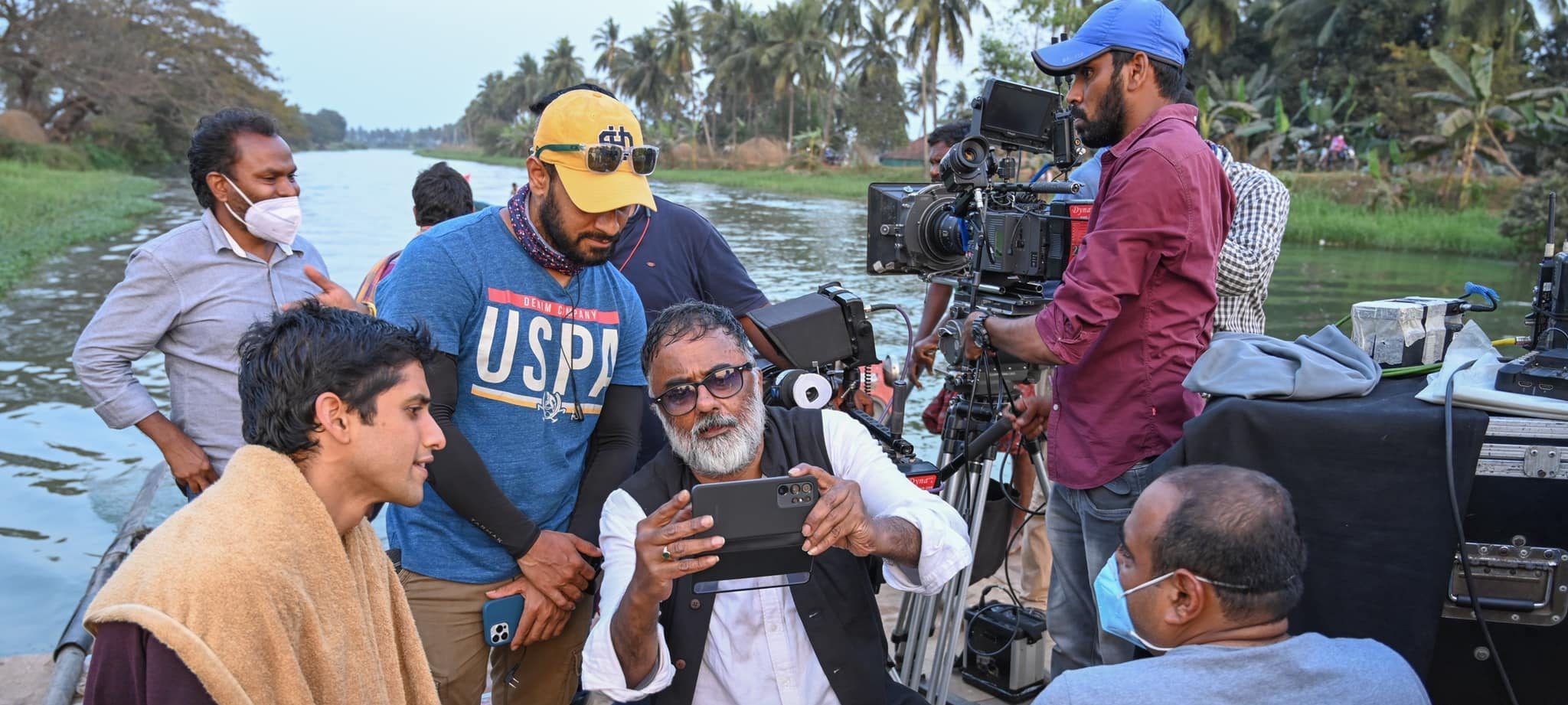Published Aug 01, 2022 | 8:33 PM ⚊ Updated Aug 05, 2022 | 10:08 AM

Actor Naga Chaitanya on the sets of Thank You. (Facebook)
With the shooting of ongoing and new films coming to a grinding halt in Tollywood from Monday, 1 August, the employees and workers of 24 crafts are staring at a bleak future.
Telugu film producers, after a general body meeting held in Hyderabad on Sunday, announced that they had decided to voluntarily suspend all film shootings until further notice. The decision was taken to resolve the issues that the industry has been facing since the Covid-19 pandemic.
However, for the likes of makeup artist G Ramanjaneyulu, the decision has come as a huge blow. Now, he is worried that he has to relive the horrifying days of the Covid-19 lockdowns when he had to leave for his native place in search of work.
“At least 800 makeup artists like me will find themselves jobless if they [the producers] suspend shooting for a long time. We can manage for a month or two by taking loans, but not more than that,” he told South First.
“In fact, we can’t even work in the neighbouring states (other industries), due to our union (the Telugu Cine & TV Makeup Artists & Hairstylists Union) cards. In my case, the only option I’ll be left with is to go back to my village and work as a labourer, just like in the pandemic times. I have six mouths to feed, and I’m the sole breadwinner,” Ramanjaneyulu said.
Nevertheless, he is hopeful that the producers’ decision to suspend shoots would help address the crisis in the industry.
Unlike earlier, every actor has personal assistants, including hair and makeup artists, costume designers, bouncers and personal artist managers and secretaries nowadays. The producer has to bear the expenses of these assistants, including their flight tickets, equipment, food, etc.
“The personal assistants charge a minimum of ₹5,000 per call sheet. A makeup artist from the union is paid ₹1,800 per call sheet, while personal makeup artists charge ₹10,000. Now that character artists too are hiring two-three personal assistants, the producer of a medium-budget film is forced to spend over ₹1 lakh on them alone,” director Kiran Korrrapati, who debuted with Varun Tej’s Ghani, told South First.
According to Ramanjaneyulu, all makeup artists have to register with the union, and can’t work as personal assistants for the first five years of registration.
Personal managers, who oversee the call sheets — the daily film schedule created by assistant directors of a movie — of actors, are usually paid on a commission basis: 10 percent of the latter’s remuneration. But the actors are cleverly managing to get this commission amount from the producers.
“Earlier, character artists were paid on an hourly basis. But now, they are charging lakhs, that too per call sheet, even if the day’s shoot involves only a couple of scenes. They leave the sets at 6 pm and are to be informed earlier about night shoots,” production manager Srinivas (name changed) told South First.
As a production manager, Srinivas is responsible for all the technical operations in filmmaking. He supervises the production activities, plans and coordinates the workers’ shifts and ensures that the production is carried out on time and within the budget
According to him, character artists, too, are demanding personal caravans these days.
Besides, the producers are forced to foot the bills of family members, friends, guests, and pets accompanying stars and character artists to film sets.
“All these are in addition to the hefty remuneration the actors charge for a project. Given the substantial rise in production costs and such wastage of budget due to exploitation, the producers are unable to cope with the losses,” he claimed.
When technicians like fight masters, cinematographers, and choreographers from other languages or industries are hired for a project here, the respective producers have to bear their accommodation (at least ₹2,000 a day for hotel stay), travel, food, equipment, and related expenses.
“However, these technicians come with their team of assistants who are to be paid a minimum of ₹1,100 per call sheet,” said Kiran.
“In general, it costs approximately ₹1 lakh per day for a movie involving 100 technicians. Thus, there will be a difference in the budget estimates by about ₹2-3 crore for a ₹30-crore film and about ₹5-10 crore for a ₹50-crore film, which isn’t a meagre amount,” the director explained.
The cine workers — right from drivers and electricians to junior artists and production assistants — are dependent on the daily wages paid by production houses. They can’t simultaneously work on two projects, owing to the different schedules (which are fixed based on the call sheets of the actors).
“Sadly, despite working continuously for 12-14 hours, we don’t get paid at the end of the day. Only a few production houses pay us daily after our shift ends. We usually have to wait three-four months for the dues to be cleared,” light boy Kamal (name changed) revealed.
“We can’t approach the producer(s) directly. Our complaints or issues have to be forwarded to the Telugu Film Industry Employees’ Federation (TFIEF) through our respective unions. The federation, in turn, brings these to the notice of the Telugu Film Producers’ Council (TFPC) or the Film Chamber of Commerce for resolution. There’s a protocol for everything,” he explained.
On 22 June, over 20,000 workers of the Telugu film industry staged an indefinite strike demanding better wages — with a 45 percent hike — and working conditions. They called off the stir after the TFPC promised to look into their concerns.
“Though the cost of essential commodities is increasing by the day, the wages of workers have been the same in the past three years. This is why the federation demanded a 45 percent wage hike, medical insurance, regularisation of payment, and a provision for workers to improve their skills,” Film Federation president V Anil Kumar told The Times of India at the time.

Annapurna Studios wore a deserted look on 1 August with the Telugu film producers voluntarily suspending the shootings. (South First)
The decision to halt shootings would predominantly affect the workers of 24 crafts who are involved in film production, production assistant Akbar (name changed) told South First.
“Though production managers draw salaries per film, it takes at least three months for them to find another project. Until then, they’re on their own. For workers like me, who are paid ₹500-1,500 per call sheet, it’s no less than a nightmare. In most cases, men are the only wage-earners. We hardly get to see women working,” he explained.
Interestingly, not many know that the employees get work only for 10-15 days a month.
The post-production team — including music directors, editors, animators, and visual effects editors — are not affected as they are paid lakhs of rupees per project.
It’s no secret that the Telugu film producers, exhibitors, and distributors have been reeling under the impact of the pandemic, as most of the movies registered a subpar performance at the box office.
Other than Pusha-The Rise (with a worldwide collection of ₹355-360 crore), RRR (₹1,150-1,200 crore), Major (₹64-66 crore), DJ Tillu (₹30 crore) and Bangarraju (₹64 crore), every film released in the recent past proved to be a dud.
Indeed, the industry suffered huge losses as theatrical revenues dropped to 20 percent and the success rate of movies fell to an alarming 5 percent from 10 percent, noted producer Dil Raju told reporters recently.
Interestingly, these flops had put up a decent run on OTT platforms.
Raju attributed the losses to bad content, early OTT releases, and a change in the mindset of audiences after the Covid-19 pandemic.
In fact, he claimed to have asked his teams to rework existing scripts after analysing the audience’s interests and start shooting accordingly.
Kiran concurred. “A film is usually released on an OTT platform only a month after its theatrical release. But our Ghani was released just two weeks after its theatrical release,” he said.
“We did understand that the distributors wanted to make up for the losses they incurred due to its poor performance in cinema halls. But this doesn’t always hold true.”
During the Covid-19 lockdowns, the audiences got access to international content in regional languages through OTT platforms.
As a result, there has been a shift in their mindset and tastes. They are of late evincing more interest in content-based and realistic films.
“There was a time when social dramas were a huge hit. But the trend has now gradually shifted to thrillers, romantic comedies, fantasy, and content-based movies. As directors and writers, it is now our responsibility to feel the pulse of the audience and upgrade ourselves,” said Kiran.
Meanwhile, writer-director Vichitrakar, who reviews films and web series for South First, felt that the decision to halt shoots came quite late.
“The issues have been pending in Tollywood for more than eight years now. The producers took a huge leap now because our Telugu cinema has, of recent, been performing awfully at the box office.”
The reasons for box-office debacles are many and there are clear lapses in many departments, which need to be addressed at the earliest, he said.
“Earlier, producers used to dictate terms in the industry. Then came the era of directors, and it’s now the turn of star heroes,” he explained.
“The stars indeed demand hefty remuneration as per their market price. But burdening producers with the expenses of personal assistants and guests is unethical and unprofessional,” said the filmmaker.
Vichitrakar also hoped that producers would come up with a modest revenue model and the right solutions that would help restructure the Telugu film industry. Well, only time will tell!
(With inputs from Deeksha Devadiga)

